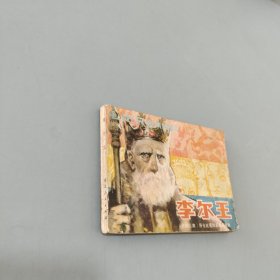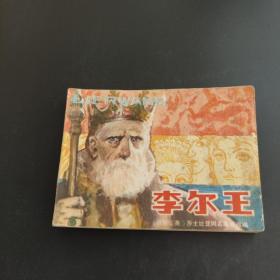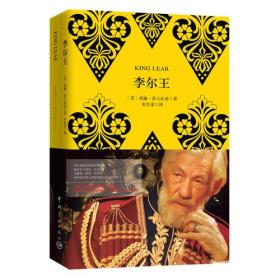
李尔王
全新正版 极速发货
¥ 10.55 3.0折 ¥ 35 全新
库存5件
广东广州
认证卖家担保交易快速发货售后保障
作者(英)威廉·莎士比亚(William Shakespeare) 著
出版社译林出版社
ISBN9787544772990
出版时间2018-04
装帧平装
开本16开
定价35元
货号1201689542
上书时间2024-07-01
- 最新上架
商品详情
- 品相描述:全新
- 商品描述
-
作者简介
威廉·莎士比亚,英国文艺复兴时期伟大的剧作家、诗人,欧洲文艺复兴时期人文主义文学的集大成者,全世界很好的文学家之一。英国戏剧家本·琼森称他为“时代的灵魂”,马克思称他与古希腊的埃斯库罗斯为“人类很伟大的戏剧天才”。
目录
List of Illustrations
Introduction
Textual Introduction and Editorial Procedures
THE HISTORY OF KING LEAR
The Ballad of King Lear
Offshoots of‘King Lear’
Alterations to Lineation
Index
内容摘要
威廉·莎士比亚著的《李尔王(英文版)》叙述了年事已高的李尔王意欲把国土分给3个女儿,口蜜腹剑的大女儿戈那瑞和二女儿里甘赢其宠信而瓜分国土,小女儿科迪莉亚却因不愿阿谀奉承而一无所得。前来求婚的法兰西国王慧眼识人,娶科迪莉亚为皇后。李尔王离位,大女儿和二女儿居然不给其栖身之地,当年的国王只好到荒郊野外……科迪莉亚率队攻入,父女团圆。但战事不利,科迪莉亚被杀死,李尔王守着心爱的小女儿的尸体悲痛地死去。
精彩内容
【序言】Introduction Once upon a time, probably in 1605, a man called William Shakespeare, using a quill pen, wrote a play about the legendary British King Lear and his three daughters. How often he drafted and redrafted his script we do not know; the version that reached print in 1608, and which seems to have been his first completed manuscript of the play, contains some 25,000 words. Shakespeare’s penning of these words has had consequences that he cannot have foreseen. It has resulted in countless theatrical performances, many of them in languages that he cannot have known and in countries of which he can have had no inkling. It has enhanced—and occasionally diminished—the reputation of innumerable actors. It has stimulated other writers—playwrights, novelists, poets, essayists—to produce an enormous body of work. It has generated a multiplicity of works by artists in other media—visual art, music, opera, film and television. It has provoked, espely in the twentieth century, a vast body of scholarly and critical writing. And it produced a work which, at least since the Romantic period (with its admiration for the Sublime), has come to be regarded not only as its author’s finest literary achievement, but also as one of the most profound and challenging examinations ever undertaken of what it means to be human, an examination conducted not discursively but in a text that requires actors to represent men and women in action that is often violent, in extremes of suffering, and in repose. In imaginative scope and in its power to generate intellectual and emotional response, King Lear has been compared with the greatest masterpieces of art, literature, and music. Coleridge wrote of the storm scenes: ‘O, what a world’s convention of agonies is here!...surely such a scene was never conceived before or since. Take it but as a picture for the eye only, it is more terrific than any which a Michel Anglo, inspired by a Dante, could have conceived, and which none but a Michel Angelo could have executed.’【前言】Any Shakespeare editor must incur immense debts to generations of predecessors. In working on King Lear I have been fortunate to be able to draw on a long and distinguished editorial and scholarly tradition extending back beyond Nicholas Rowe to Heminges and Condell or their assignees who worked on the First Folio, and to the anonymous but intelligent workmen who tried to make sense of the first Quarto in preparing copy for the reprint of 1619. above all I have had the advantage and stimulus of being able to consult excellent recent, fully annotated editions by three good friends, the late Kenneth Muir, Jay Halio, and R. A. Foakes. I have done what I can to make my edition complement rather than rival theirs. My text is heavily indebted to that prepared, with my collaboration, by Gary Taylor for the Oxford Complete Works of 1986, but I have rethought a number of its readings. A General Editor contributing to his own series is rather in the position of an actor who directs himself in a leading role. For the kind of direction that I should normally hope to provide to a member of my company I am espely indebted to Roger Warren, Robert Smallwood, john Jowett, and M. J. Kidnie, each of whom has offered helpful criticism of substantial stretches of my performance. Among other scholars who have been generous in sharing their expertise I should mention Jeremy Barlow, J. M. Binns, Anthony Burton, Paul Edmondson, Melvin Earles, Richard Knowles, Joan Lane, the late Peggy Munoz Simons, Steve Sohmer, Marvin Spevack, and Martin Wiggins. I have benefited greatly from the willing assistance of library staff at the Shakespeare Centre and the Shakespeare Institute, and am espely grateful to Sylvia Morris at the former and James Shaw at the latter. Kate Welch has compiled the index. Jessica Wells helped with a tedious piece of keyboarding, and Clemency Wells advised on a point of horsemanship. In putting the edition through the press I have been fortunate once again to have Christine Buckley as a scrupulous copy editor. At oxford University Press Frances Whistler has been an unfailing and immensely generous source of wise advice and practical help. Stanley WellsThe Shakespeare Birthplace TrustStratford-upon-AvonJuly 2000
相关推荐
— 没有更多了 —




















以下为对购买帮助不大的评价